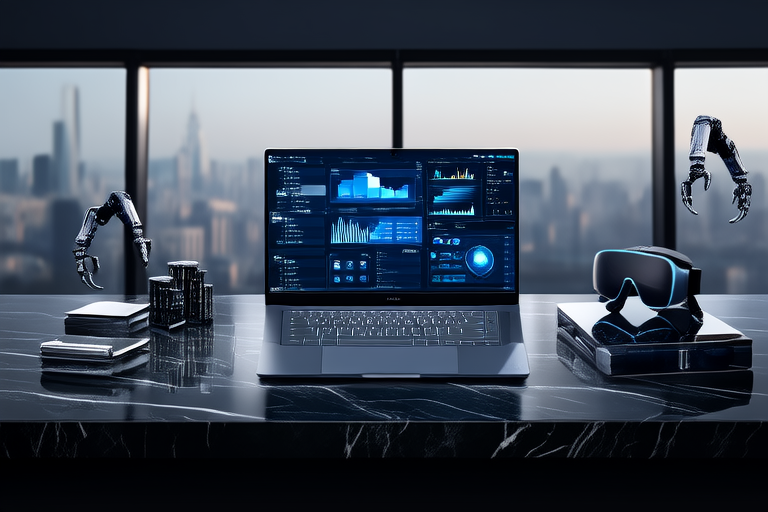From Healthcare to Finance: The Multifaceted Impact of AI in Modern Industry
Introduction
Artificial Intelligence (AI) has emerged as a transformative force across various industries, reshaping traditional practices and driving unprecedented levels of innovation. Defined broadly as the simulation of human intelligence processes by machines, AI encompasses machine learning, natural language processing, robotics, and more. Its ability to analyze vast amounts of data, identify patterns, and make informed decisions has made it an indispensable tool for businesses, governments, and individuals alike.
This article aims to explore the multifaceted impact of AI in modern industry, focusing specifically on its revolutionary effects in healthcare and finance. Additionally, we will examine the broader implications of AI in other sectors such as manufacturing, retail, transportation, and education. By delving into the challenges and opportunities presented by AI adoption, this piece seeks to provide a comprehensive overview of its role in shaping the future of these industries.
AI in Healthcare
The healthcare sector stands at the forefront of AI integration, with significant advancements in patient care, diagnostics, and treatment planning. AI-powered diagnostic tools enable faster and more accurate identification of diseases, often detecting conditions that might otherwise go unnoticed. For instance, AI algorithms can analyze medical images like X-rays and MRIs to spot anomalies indicative of cancer or other serious illnesses at an earlier stage than human practitioners alone could achieve.
Personalized medicine is another area where AI shows promise. By analyzing genetic data, lifestyle factors, and medical histories, AI systems can tailor treatments to individual patients, optimizing outcomes while minimizing side effects. Predictive analytics also plays a crucial role in healthcare, helping institutions forecast patient needs, allocate resources efficiently, and manage chronic conditions proactively.
Advanced technologies such as robotic surgery represent another frontier in AI-assisted healthcare. These systems allow surgeons to perform complex procedures with greater precision and control than ever before. Telemedicine, facilitated by AI-driven communication platforms, ensures that remote consultations remain seamless and effective, bridging geographical gaps between patients and specialists.
However, the integration of AI into healthcare isn’t without its challenges. Ensuring data privacy and security remains paramount, especially given the sensitive nature of health information. Ethical considerations surrounding decision-making processes and accountability also come into play when relying heavily on AI-driven solutions. Balancing technological advancement with human oversight is essential to maintaining trust and ensuring equitable access to cutting-edge care.
AI in Finance
In the finance industry, AI is revolutionizing operations through enhanced fraud detection, optimized investment strategies, and improved customer engagement. Machine learning models can sift through large datasets to identify suspicious transactions quickly, reducing the likelihood of fraudulent activities succeeding undetected. Algorithmic trading leverages AI to execute trades based on real-time market analysis, offering traders competitive advantages over traditional methods.
Customer service automation借助AI技术,通过聊天机器人和虚拟助手提高了效率。这些工具可以快速响应客户查询,提供个性化建议,并处理常见问题,从而减少了人工客服的工作量。此外,在风险管理方面,AI可以帮助金融机构识别潜在风险,确保合规性,并优化投资组合以最大化回报。
然而,金融行业中使用AI也带来了潜在的风险和监管挑战。数据隐私、网络安全以及模型的透明度都是需要认真考虑的问题。确保AI系统的公平性和可解释性对于维护公众信任至关重要。随着技术的进步,监管机构也需要不断更新法规,以适应新的风险环境。
AI in Other Industries
除了医疗和金融领域外,人工智能还在其他多个行业中发挥着重要作用。在制造业中,人工智能用于质量控制、预测性维护和供应链管理等方面。例如,智能传感器可以实时监控设备状态,提前发现故障,减少停机时间并提高生产效率。个性化学习平台则为教育行业带来了革命性的变化,通过分析学生的学习习惯和进度,提供定制化的教学内容和支持。
在零售业中,人工智能帮助商家更好地理解消费者需求,优化库存管理和定价策略。推荐系统可以根据用户的浏览历史和购买行为,为他们提供个性化的商品推荐,从而提高销售转化率。自动驾驶汽车则是交通运输领域的亮点之一,它不仅有望改善交通安全,还能缓解交通拥堵,提升物流效率。
总之,无论是在哪个行业中,人工智能都展示了巨大的潜力,能够显著提高效率、降低成本并推动创新。然而,要想充分发挥这些优势,企业必须克服一系列挑战,包括数据隐私保护、网络安全防护以及员工技能的再培训等。
Challenges and Opportunities
尽管人工智能为各个行业带来了诸多好处,但其广泛应用也伴随着一系列挑战。首先是数据隐私问题,尤其是在涉及个人敏感信息时。其次,网络安全威胁日益增加,黑客可能会利用漏洞攻击AI系统。最后,随着自动化程度的提高,部分工作岗位可能会受到影响,导致劳动力市场的结构性变化。
然而,面对这些挑战的同时,我们也看到了许多机会。首先,人工智能可以帮助企业更有效地利用资源,降低成本并提高生产力。其次,它可以促进新产品和服务的开发,创造新的商业机会。最后,通过提供更好的产品和服务体验,人工智能有助于增强客户忠诚度。
Conclusion
综上所述,人工智能正在深刻地改变着各行各业,并且其影响范围还在不断扩大。从医疗保健到金融服务,再到制造业、零售业和交通运输等领域,人工智能的应用已经取得了令人瞩目的成果。虽然在这个过程中遇到了一些挑战,但只要妥善应对,就能够释放出无限的可能性。
展望未来,我们可以期待更多基于人工智能的技术创新。随着算法的进步和计算能力的增强,我们有理由相信,人工智能将继续推动各行业的进步和发展。同时,我们也应该关注伦理和社会影响,确保技术的发展符合人类的利益。




